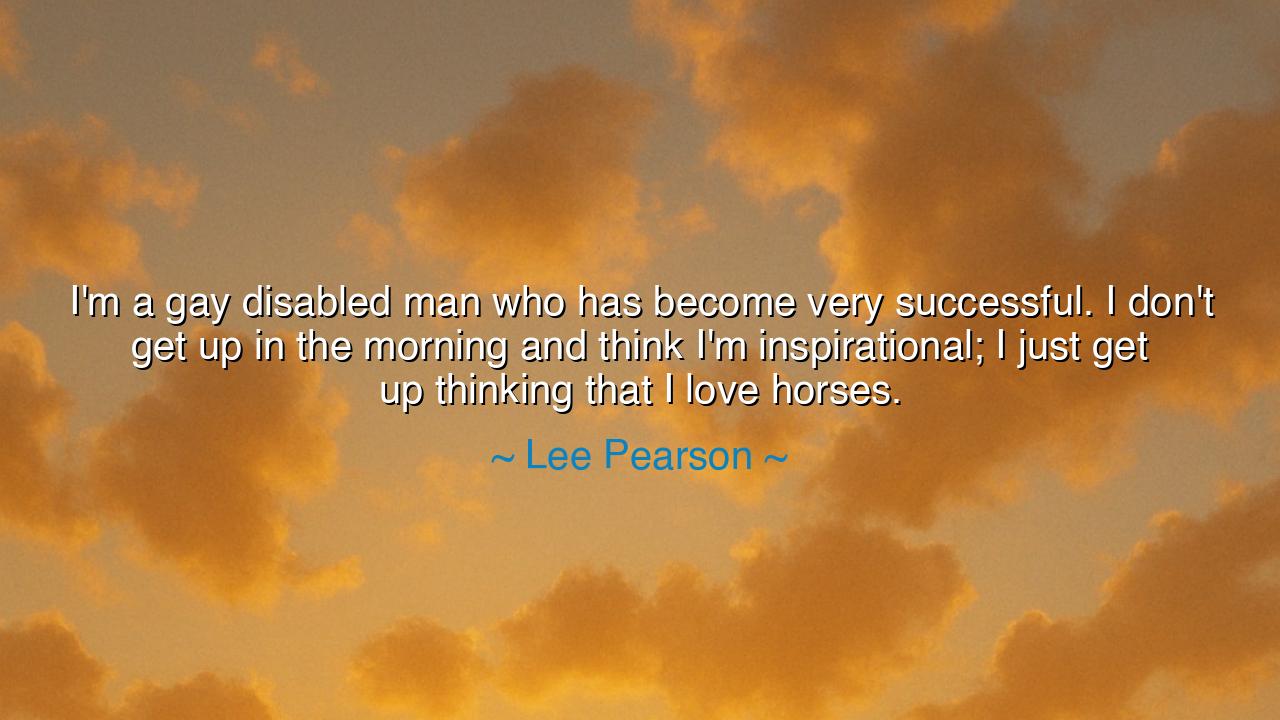
I'm a gay disabled man who has become very successful. I don't
I'm a gay disabled man who has become very successful. I don't get up in the morning and think I'm inspirational; I just get up thinking that I love horses.






In the humble yet profound words of Lee Pearson, there is a wisdom that transcends identity and fame: “I'm a gay disabled man who has become very successful. I don't get up in the morning and think I'm inspirational; I just get up thinking that I love horses.” Here speaks not the voice of pride, but of peace — a man who has learned that greatness lies not in titles or labels, but in love for one’s purpose. His words are a gentle rebuke to a world too eager to define people by their struggles rather than by their passions. For Pearson, true triumph is not in being seen as exceptional, but in living truthfully, in harmony with what one loves.
The meaning of his reflection lies in the simplicity of its wisdom. Society, in its haste to celebrate heroes, often forgets that heroes do not wake each day to perform heroism. They live, they labor, they love — as naturally as the sun rises. Pearson reminds us that he does not seek to be “inspirational”; inspiration is the byproduct, not the aim. What he seeks instead is connection — with his horses, with his craft, with the joy that gives his life rhythm. The lesson is clear: to live with purpose, one must act not for applause, but for affection — for the quiet, enduring love of one’s calling.
The origin of his humility can be traced to the very nature of the human spirit. Across centuries, those who achieved the greatest things rarely set out to be admired; they set out to be whole. Consider Helen Keller, who, though blind and deaf, sought not fame but understanding, not praise but participation in the world of thought. Her greatness was born not from the absence of obstacles, but from her refusal to be defined by them. Likewise, Lee Pearson, a champion of Paralympic dressage, measures his success not by medals, but by the harmony he feels when he rides — the oneness between man and horse, heart and motion, love and discipline.
The horses he speaks of are not mere creatures in his story; they are symbols — embodiments of freedom, grace, and partnership. In the ancient world, the horse was revered as the companion of heroes. The chariots of Achilles, the steeds of Alexander, the warhorses of knights — all bore men to glory. But Pearson’s horse bears him to peace. Through their rhythm, he finds balance; through their trust, he finds equality. They do not see him as disabled, nor as gay, nor as successful — they see only the spirit that rides within him. In this, he finds liberation, for in their eyes, he is not defined by limitation, but by connection.
In the ancient schools of philosophy, the Stoics taught that to live well is to align the self with nature — to accept what one cannot change and to excel in what one can. Pearson’s words resonate with this truth. He does not deny his identity; he simply refuses to make it the center of his existence. His love for horses, his craft, and his purpose transcends all categories. Like the Stoic sage, he understands that joy lies not in how the world sees you, but in how fully you dwell in the present moment. His mornings are not burdened by expectation, but lifted by gratitude — gratitude for life, for movement, for love.
And yet, in rejecting the title of “inspirational,” Pearson becomes more inspirational still. For he shows that true courage is not the loud defiance of adversity, but the quiet mastery of one’s life. He stands as proof that success, when born of sincerity, needs no embellishment. The world often mistakes visibility for virtue, but Pearson reminds us that greatness whispered through authenticity rings louder than any shouted performance. His success is not his identity, but the natural outcome of a soul aligned with its joy.
From his story, we draw a timeless lesson: live for love, not for legacy. Let passion, not perception, guide your days. Whether your “horses” are literal or symbolic — the craft you cherish, the work you tend, the dream you nurture — let them be your reason for rising. Do not chase the image of inspiration; instead, embody it quietly through devotion. As Lee Pearson teaches, when you live simply and sincerely, doing what you love despite the labels the world gives you, you become the very thing you never sought to be — a living example of grace, courage, and truth.
So, rise each morning not asking how to inspire, but how to love. Love your craft, your companions, your moments of motion and stillness. For in loving what you do, you transcend every boundary — and in that, you, too, will find freedom on the back of your own horse of purpose, galloping toward a life that is not admired merely from afar, but deeply, quietly, beautifully lived.






AAdministratorAdministrator
Welcome, honored guests. Please leave a comment, we will respond soon